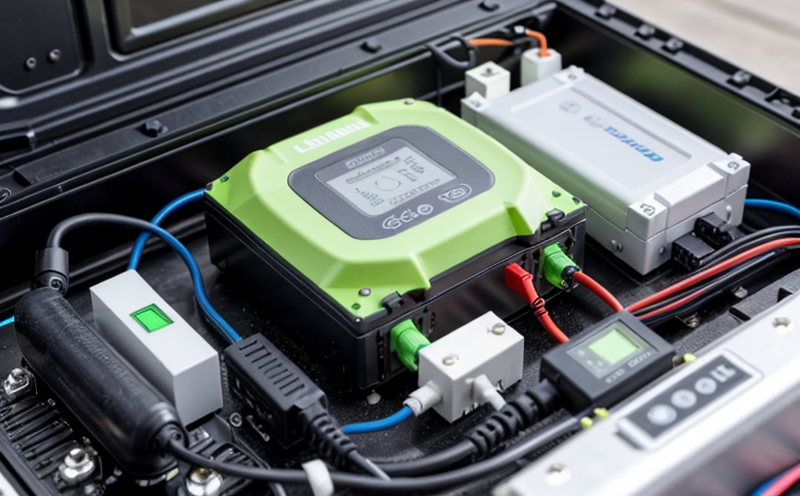EN 62133 Lithium-Ion Battery Safety Testing for Portable Devices
The Importance of EN 62133 Compliance in the Portable Device Industry: Ensuring safety standards are critical, especially when dealing with lithium-ion batteries used in portable devices such as smartphones, laptops, and other consumer electronics. The European Standard EN 62133 provides a robust framework for assessing the safety of these batteries by addressing various potential hazards that could arise during their lifecycle—from manufacturing to disposal.
The standard covers several key areas including thermal management, mechanical integrity, electrical performance, and chemical stability. Compliance with EN 62133 not only ensures product safety but also enhances brand reputation and protects consumers from risks associated with battery malfunctions like overheating or explosions. This is particularly important given the increasing complexity of modern electronic products.
Testing according to this standard involves rigorous procedures designed to simulate real-world conditions that could stress a lithium-ion battery. For instance, manufacturers must conduct thermal abuse tests where batteries are exposed to high temperatures (up to 90°C) for extended periods. Mechanical abuse tests involve dropping the batteries from specified heights onto steel plates or subjecting them to compression forces. Additionally, electrical overcharge and short circuit tests evaluate how well a device can handle extreme conditions without failing.
Given the rapid pace of technological advancement in portable devices, it is essential that manufacturers stay ahead of regulatory changes. By adhering strictly to EN 62133 guidelines during development stages, companies avoid costly recalls and potential legal issues down the line. Furthermore, successful compliance can lead to increased market share by appealing to consumer concerns about safety.
At Eurolab, our team specializes in providing comprehensive lithium-ion battery safety testing services tailored specifically towards portable device manufacturers. We utilize state-of-the-art equipment capable of simulating all necessary scenarios required under EN 62133, ensuring accurate and reliable results every time.
Eurolab Advantages
- Expertise: Our team comprises highly skilled professionals with extensive experience in battery safety testing. They stay updated on the latest standards and trends within the industry, allowing us to offer cutting-edge solutions.
- Precision Instruments: We employ top-tier testing instruments that deliver precise measurements essential for accurate analysis of battery performance across different parameters.
- Comprehensive Services: From initial consultation to final reporting, we provide a full suite of services aimed at meeting all your testing needs efficiently and effectively.
- Regulatory Compliance: Ensuring strict adherence to relevant international standards like EN 62133 helps you maintain compliance while minimizing risks associated with non-conformance.
By partnering with Eurolab, you gain access to resources and expertise that will help streamline your testing process, reduce costs, and ensure superior quality in your products. Contact us today to learn more about how we can support your organization's goals through advanced lithium-ion battery safety testing services.
Environmental and Sustainability Contributions
The pursuit of sustainability has become increasingly important across various industries, including electronics manufacturing. By ensuring compliance with EN 62133 Lithium-Ion Battery Safety Testing for Portable Devices, companies contribute positively to environmental conservation efforts in several ways:
- Reduction of Hazards: Minimizing the risk of fires or explosions reduces the likelihood of accidental releases into ecosystems.
- Resource Efficiency: Properly designed and tested batteries last longer, reducing waste generated from premature failures.
- Emission Control: Safer products mean fewer accidents leading to less pollution during manufacturing and disposal processes.
Incorporating sustainable practices into the design phase of lithium-ion batteries is crucial for protecting both human health and the environment. At Eurolab, we recognize these challenges and work diligently towards developing innovative testing methodologies that support greener development strategies within our sector.
Competitive Advantage and Market Impact
Meeting Regulatory Requirements: In today's highly competitive market, staying ahead of regulatory requirements is crucial. By obtaining certification for EN 62133 Lithium-Ion Battery Safety Testing, manufacturers demonstrate their commitment to quality and safety, which can significantly enhance brand reputation among consumers.
- Innovation: Adhering closely to strict standards like EN 62133 encourages continuous improvement in product design. This fosters innovation by pushing boundaries beyond mere compliance into territory characterized by excellence.
- Customer Trust: When buyers see that a company has invested resources into ensuring the safety of its products, they are more likely to trust them implicitly. This builds long-term relationships based on reliability and integrity.
- Differentiation: Amongst numerous competitors vying for attention in crowded markets, demonstrating exceptional adherence to stringent safety protocols sets brands apart as leaders committed to excellence.
These advantages translate directly into tangible benefits such as increased sales volumes, higher customer satisfaction ratings, and improved brand loyalty. Moreover, being able to boast about meeting such demanding standards can attract new customers looking for trustworthy suppliers or partners in the industry.





